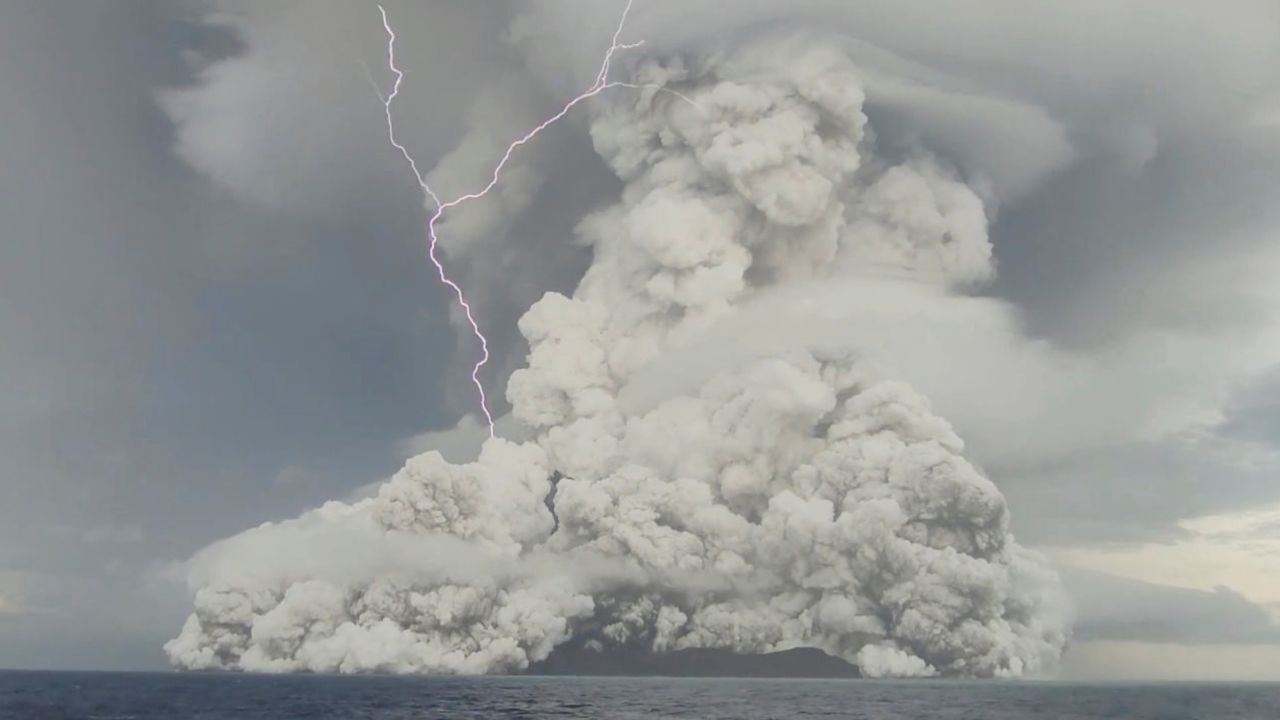The effects of the Tonga volcano eruption are expected to last for years 1:29
(CNN) --
When the Hunga Tonga-Hunga Ha'apai volcano erupted in January 2022, it shocked the world.
Not only did it cause widespread tsunamis, but it also ejected enormous amounts of climate-warming water vapor into the stratosphere.
Now, researchers in a new report have revealed something else: The eruption triggered more than 25,500 lightning strikes in just five minutes.
In just six hours, the volcano caused almost 400,000 lightning strikes.
Half of all the lightning in the world was concentrated around this volcano at the height of the eruption.
The "cataclysmic eruption" broke "all records," according to the report by Vaisala, an environmental monitoring company that tracks lightning strikes around the world.
"This is the most extreme concentration of lightning we've detected so far," Chris Vagasky, a meteorologist and lightning expert at Vaisala, told CNN.
"We've been detecting lightning for 40 years, and this is really an extreme event."
One-minute snapshots of lightning over the Tonga volcano eruption on January 15.
Lightning encircled the volcano "in distinctive ring patterns during the peak of the eruption," Vaisala reports.
(Credit: Vaisala)
Vaisala's annual report revealed that 2022 was a year of extreme lightning.
Lightning increased in the United States in 2022, with more than 198 million lightning strikes, 4 million more than observed in 2021 and 28 million more than in 2020.
advertising
"We're continuing an upward trend in lightning," Vagasky said.
The Global Lightning Tracking Network, another lightning monitoring network run by the University of Washington, which is not involved in the report, said Vaisala's findings on global lightning, as well as the Hunga volcano, are consistent with their own findings. observations.
"We can do it because the strongest eruptions generate lightning, and lightning sends detectable radio signals around the world," Robert Holzworth, director of the network, told CNN.
"The Hunga eruption was absolutely stunning for its lightning activity."
The volcanic eruption in Tonga was the most powerful in 140 years
Researchers have used lightning as a key indicator of the climate crisis, as the phenomenon often signals warming temperatures.
Lightning occurs in energetic storms associated with an unstable atmosphere, requiring relatively warm and humid air, which is why it occurs mainly in tropical latitudes and elsewhere during the summer months.
But in 2022, the Vaisala National Lightning Detection Network detected more than 1,100 lightning strikes in Buffalo, New York, during a devastating lake-effect snowstorm that dumped more than 75 centimeters of snow on the city, but racked up record totals of more than 1.8 meters in the surrounding suburbs along Lake Erie.
Lake effect snow is produced when cold air blows over warm lake water, in this case the Great Lakes.
The large temperature difference can cause extreme instability in the atmosphere and trigger lightning similar to thunderstorms, even in a snowstorm.
More than 1,100 lightning strikes were detected in Buffalo, New York, during a devastating lake-effect blizzard that dumped more than 30 inches of snow on the city but racked up record totals of more than 6 feet in surrounding suburbs over the course of along Lake Erie.
(Credit: John Normile/Getty Images)
The report noted that many of these lightning strikes occurred near wind turbines south of Buffalo, which Vagasky said was significant.
He explained that the clouds filled with ice crystals were closer to the ground than usual, skimming just above the turbine blades.
"That can cause what's known as self-initiated upward lightning," Vagasky said.
"So the lightning occurs because it's been charged at the tip of this wind turbine blade which is very close to the cloud base, and it's very easy to get a connection to the electrical charge."
This is an area of ongoing research, he said, as the country moves toward cleaner energy alternatives.
"We're seeing bigger and bigger wind turbines all the time, and certainly as we put more and more wind power and renewables in, lightning is going to play a role in that," he said.
The report comes after an unusual year in 2021, when they found that lightning increased significantly in the typically icy Arctic region, which scientists say is a clear sign of how the climate crisis is altering global weather.
"Lightning in the polar regions was not mentioned (in this year's Vaisala report), but our global lightning network shows a trend of much more lightning in the northern polar regions," Michael McCarthy, associate professor, told CNN. Research Fellow and Associate Director of the Global Lightning Locating Network.
"This trend closely tracks observed changes in the average temperature of the Northern Hemisphere."
"This close monitoring suggests, but does not prove, an effect of climate change," McCarthy added.
Volcano eruption near Tonga sent hurricane-force winds into space
Vagasky said lightning in colder areas will only amplify as the planet warms, noting that meteorologists and climatologists have been collecting more data not only to clarify weather connections, but also to keep people safe.
"That's why lightning is considered an essential climate variable," he said, "because it's important to know where it strikes, how many strikes, and to see the trend of storms as a result of climate change."
TongaVolcano








/cloudfront-eu-central-1.images.arcpublishing.com/prisa/KMEYMJKESBAZBE4MRBAM4TGHIQ.jpg)


